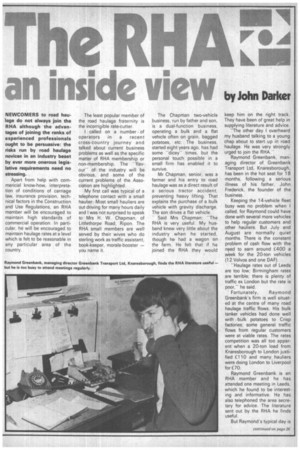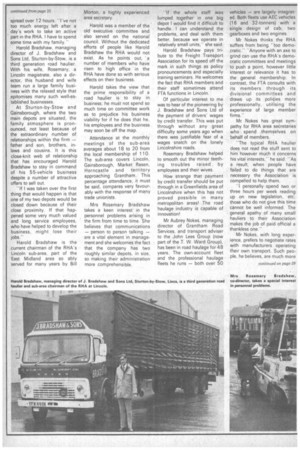Th e Ill . d • an e view by John Darker
Page 27

Page 28

If you've noticed an error in this article please click here to report it so we can fix it.
NEWCOMERS to road haulage do not always join the RHA although the advantages of joining the ranks of experienced professionals ought to be persuasive: the risks run by road haulage novices in an industry beset by ever more onerous legislative requirements need no stressing.
Apart from help with cornmencial know-how, interpretation of conditions of carriage law, insurance provision, technical factors in the Construction and Use Regulations, an RHA member will be encouraged to maintain high standards of commercial operation. In particular, he will be encouraged to maintain haulage rates at a level which is felt to be reasonable in any particular area of the country. The least popular member of the road haulage fraternity is the incorrigible rate-cutter. called on a number of operators in a recent cross-country journey and talked about current business problems as well as the specific matter of RHA membership or non-membership. The "flavour" of the industry will be obvious, and some of the current problems of the Association are highlighted.
My first call was typical of a telephone contact with a small haulier. Most small hauliers are out driving for many hours daily and I was not surprised to speak to Mrs H. W. Chapman, of Littlethorpe Road, Ripon. The RHA small members are well served by their wives who do sterling work as traffic assistant, book-keeper, morale-booster — you name it. The Chapman two-vehicle business, run by father and son, is a dual-function business, operating a bulk and a flat vehicle often on grain, bagged potatoes, etc. The business, started eight years ago, has had some "dicey" times, but the personal touch possible in a small firm has enabled it to survive.
Mr Chapman, senior, was a farmer and his entry to road haulage was as a direct result of a serious tractor accident, preventing heavy lifting. That explains the purchase of a bulk vehicle with gravity discharge. The son drives a flat vehicle.
Said Mrs Chapman: "The RHA is very useful. My husband knew very little about the industry when he started, though he had a wagon on the farm. He felt that if he joined the RHA they would keep him on the right track_ They have been of great help in supplying literature and advice.
"The other day I overheard my husband talking to a young chap about to start up in road haulage. He was very strongly urged to join the RHA."
Raymond Greenbank, managing director of Greenbank Transport Ltd, Knaresborough, has been in the hot seat for 18 months, following a serious illness of his father, John Frederick, the founder of the business.
Keeping the 14-vehicle fleet busy was no problem when I called, for Raymond could have done with several more vehicles to help regular customers and other hauliers. But July and August are normally quiet months. There is the constant problem of cash flow with the need to earn around £400 a Week for the 20-ton vehicles (12 Volvos and one DAF).
"Haulage rates out of Leeds are too low; Birmingham rates are terrible; there is plenty of traffic ex London but the rate is poor," he said.
Fortunately, Raymond Greenbank's firm is well situated at the centre of many road haulage traffic flows. His bulk tanker vehicles had done well with bulk potatoes to Crisp factories; some general traffic flows from regular customers were at viable rates. The rates competition was all too apparent when a 20-ton load from Knaresborough to London justified £110 and many hauliers were doing London to Liverpool for £70.
Raymond Greenbank is an RHA member and he has attended one meeting in Leeds, which he found to be interesting and informative. He has also telephoned the area secretary for advice. The literature sent out by the RHA he finds useful.
But Raymond's typical day is spread over 12 hours. "I've not too much energy left after a day's work to take an active part in the RHA. I have to spend some time with my family."
Harold Bradshaw, managing director of J. Bradshaw and Sons Ltd, Sturton-by-Stow, is a third generation road haulier. With his wife, Rosemary, a Lincoln magistrate, also a director, this husband and wife team run a large family business with the relaxed style that .epitomises many such well-established businesses.
At Sturton-by-Stow and Gainsborough, where the two main depots are situated, the family atmosphere is pronounced, not least because of the extraordinary number of relationships within the firm — father and son, brothers, inlaws and cousins. It is this close-knit web of relationship that has encouraged Harold Bradshaw to stay in command of his 55-vehicle business despite a number of attractive offers to sell out.
"If I was taken over the first thing that would happen is that one of my two depots would be closed down because of their close proximity. If that happened some very much valued and long service employees, who have helped to develop the business, might lose their jobs."
Harold Bradshaw is the current chairman of the RHA's Lincoln sub-area, part of the East Midland area so ably served for many years by Bill Morton, a highly experienced area secretary.
Harold was a member of the old executive committee and also served on the national council. Without the dedicated efforts of people like Harold Bradshaw the RHA would not exist. As he points out, a number of members who have risen to high office in the RHA have done so with serious effects on their business_ Harold takes the view that the prime responsibility of a road haulier is to stay in business; he must not spend so much time on committee work as to prejudice his business viability for if he does that he, his employees and the business may soon be off the map.
Attendance at the monthly meetings of the sub-area averages about 18 to 20 from the local membership of 110. The sub-area covers Lincoln, Gainsborough, Market Rasen, Horncastle and territory approaching Grantham. This percentage attendance, it must be said, compares very favourably with the response of many trade unionists.
Mrs Rosemary Bradshaw takes a keen interest in the personnel problems arising in the firm from time to time. She believes that communications — person to person talking — are a vital element in management and she welcomes the fact that the company has two roughly similar depots, in size, so making their administration more comprehensible. "If the whole staff was lumped together in one big depot I would find it difficult to handle. I can Understand the problems, and deal with them better, because we operate in relatively small units," she said.
Harold Bradshaw pays tribute to the Freight Transport Association for its speed off the mark in such things as policy pronouncements and especially training seminars. He welcomes the fact that RHA members and their staff sometimes attend FTA functions in Lincoln.
Of particular interest to me was to hear of the pioneering by J. Bradshaw and Sons Ltd of the payment of drivers' wages by credit transfer. This was put through without any great difficulty some years ago when there was justifiable fear of a wages snatch on the lonely Lincolnshire roads.
Rosemary Bradshaw helped to smooth out the minor teeth ing troubles raised . by employees and their wives_
How strange that payment by credit transfer should be put through in a Greenfields area of Lincolnshire when this has not proved possible in many metropolitan areas! The road haulage industry is capable of innovation!
Mr Aubrey Nokes, managing director of Grantham Road Services, and transport adviser to the John Lees Group (now part of the T. W. Ward Group), has been in road haulage for 48 years. The own-account fleet and the professional haulage fleets he runs — both over 50 vehicles -are largely integrated. Both fleets use AEC vehicles (16 and 32-tonners) with a single design of cab, two gearboxes and two engines.
Mr Nokes thinks the RHA suffers from being "too democratic.-Anyone with an axe to grind can use the RHA's democratic committees and meetings to push a point, however little interest or relevance it has to the general membership. In contrast, the FTA consults with its members through its divisional committees and draws up its policies more professionally, utilising the experience of large member firms.''
Mr Nokes has great sympathy for RHA area secretaries who spend themselves on behalf of members.
"The typical RHA haulier does not read the stuff sent to him however much it concerns his vital interests,'' he said. "As a result, when people have failed to do things that are necessary the Association is compelled to help them.
"I personally spend two or three hours per week reading up on new legislation. etc; those who do not give this time cannot be well informed. The general apathy of many small hauliers to their Association makes the job of paid official a thankless one."
Mr Nokes, with long experience, prefers to negotiate rates with manufacturers operating their own transport. Such people, he believes, are much more








































































































